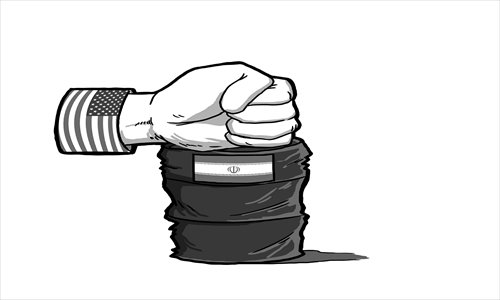US has shed all credibility over Iranian nuclear issue

US actions in relation to Iran have raised troubling questions about whether or not the US is interested in a multilateral solution to the current issue or is merely interested in imposing its own will upon Iran and the rest of the world.
The recently passed Iran Sanctions, Accountability, and Human Rights Act marks another escalation in US attempts to economically isolate Iran.
Additionally, the Obama administration's sanctions against the Bank of Kunlun represent a blatant violation of international law in the pursuit of US foreign policy.
These two actions call into question the validity of the entire P5+1 diplomatic process in the face of a nation that seeks to wield a unilateral veto over the course of negotiations with Iran.
China's trade with Iran complies fully with international law and current UN Security Council resolutions.
More importantly, these US sanctions assert the right to control the economic activity of Chinese citizens and companies in order to advance US goals.
Instead of working in partnership with China, these actions prove that the US is only interested in China's obedience when it comes to Iran. They also call the multilateral nature of negotiations with Iran into doubt.
A US so wedded to unilateral action is unlikely to feel bound by any agreements made, whether through the P5+1 talks or other parties.
This has already occurred once, with the successful US opposition to the 2010 Turkish and Brazilian offer to refine Iranian uranium in return for concessions on the part of Iran.
Furthermore, the current bill states that Congress seeks to prevent Iran from achieving a "nuclear weapons capability."
However, what exactly constitutes a nuclear weapons capability has never been clearly defined. In fact, it is a standard that may be impossible to comply with, short of the complete elimination of Iran's civilian nuclear research establishment.
The addition of the term "nuclear weapons capability" is a clear example of changing the demands placed on Iran, perhaps due to the fact that both the CIA and Israel's Mossad intelligence agency agree that Iran is not currently involved in the development of nuclear weapons.
In fact, these sanctions come at the very point where evidence of any Iranian drive to build a nuclear device is becoming less and less convincing.
If the US refuses to abandon its current drive toward unilateral action, then there is little reason for Iran to continue to work within the P5+1 framework.
Without US support for the P5+1 group, Iran cannot be assured of relief from economic sanctions in return for any concessions that might be offered.
If these negotiations are to have any chance of success, it falls to nations such as China to inform the US that it, no less than Iran, is bound by international law.
The US will no doubt protest such actions. However, if a multilateral framework for dealing with Iran is to have any hope of success, the US cannot pretend to be an equal partner while holding a continual veto over the proceedings.
Some will argue that the importance of preventing Iran from obtaining nuclear weapons justifies these unilateral US actions. But recent history discredits this argument.
After all, it was the US that presented these same urgent claims regarding Iraq, launching a war that lasted over a decade and killed hundreds of thousands of people, only to have it proven that Iraq's weapons of mass destruction were nonexistent.
Furthermore, the evidence the US presented to the world back in 2002 and 2003 was a combination of misleading information and outright falsehoods. It is very likely that the US claims against Iran are no more valid than those earlier claims about Iraq.
This makes it all the more important that the rest of the world resist these continued US attempts to control the course of negotiations while denying the sovereign rights of other nations to conduct a lawful trade with Iran.
The author is a freelance writer based in Corona, California. charlesgray109@gmail.com
Washington pushes China to get serious about sanctions